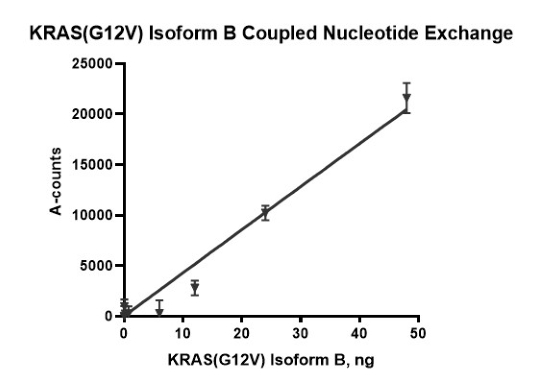KRAS(G12V) Isoform B Coupled Nucleotide Exchange Assay Kit
The KRAS(G12V) Isoform B Coupled Nucleotide Exchange Assay Kit is designed for screening and profiling of antagonists/inhibitors of KRAS(G12V), Isoform B, by monitoring the binding of an effector protein such as the Ras binding domain of Raf1 (RBD-cRaf) to KRAS. First, a sample containing GDP-loaded KRAS(G12V) Isoform B is incubated with SOS1 and GTP for the nucleotide exchange. Next, RBD-cRAF is added and incubated for the effector-RAS binding. Then, acceptor and donor beads are added and incubated for detection followed by reading the Alpha-counts.
SOS1 (son of sevenless) is a guanine nucleotide exchange factor that facilitates the exchange of GDP for GTP. GDP-loaded KRAS(G12V) Isoform B is in an inactive state and does not interact with the Ras-binding domain (RBD) of cRAF. SOS1 assists in the release of GDP from KRAS(G12V) Isoform B so that GTP can occupy the nucleotide binding pocket. This results in a conformational change in KRAS that permits its binding to RBD-cRAF. The KRAS (G12V) Isoform B Coupled Nucleotide Exchange Assay Kit utilizes GST-tagged RBD-cRAF and His-tagged KRAS(G12V) Isoform B to assay the binding of KRAS to RBD-cRAF in the AlphaLISA® assay. Glutathione acceptor and Nickel chelate donor beads are brought into proximal range by the binding of KRAS and RBD-cRAF, enabling the energy transfer from the donor to acceptor beads after laser excitation.

Figure 1: Illustration of the assay principle.
| Name | Ordering Information |
| AlphaLISA® Glutathione acceptor beads, 5 mg/ml | PerkinElmer #AL109C |
| AlphaScreen® Nickel Chelate donor beads, 5 mg/ml | PerkinElmer #AS101D |
| Optiplate -384 | PerkinElmer #6007290 |
| AlphaScreen® microplate reader | |
| Adjustable micropipettor and sterile tips |
| Catalog # | Name | Amount | Storage |
| 101355 | GDP-loaded KRAS(G12V) Isoform B, His-Tag* | 20 µg | -80°C |
| 101573 | SOS1, FLAG-Tag* | 50 µg | -80°C |
| 100519 | RBD-cRAF, GST-Tag* | 5 µg | -80°C |
| 79861-2 | GTP (10 mM) | 0.5 ml | -20°C |
| RBD-RAS Binding Buffer (Incomplete) | 2 x 3 ml | -20°C | |
| DTT (0.5 M) | 2 x 200 ml | -20°C | |
| 79311 | 3x Immuno Buffer 1 | 4 ml | -20°C |
*The concentration of the proteins is lot-specific and will be indicated on the tube.
High levels of wild-type KRAS cause a slowing of cell replication and growth, and an increased pace of apoptosis. This can be induced by cellular stress, certain types of radiation, chemical signals, and other prompts. The resulting KRAS reaction is thus considered a defensive mechanism to counteract the effects of over-activation of KRAS. Wild-type KRAS may also protect against mutant KRAS over-activation by dimerizing with mutant KRAS protein.
The study of differences in the behavior of the wild-type and mutated forms of KRAS is especially important since mutations are responsible for more than 30% of human cancers. Compounds that affect the nucleotide exchange (GDP to GTP) reaction could lead to a novel approach leading to the inhibition of tumor cell growth in KRAS driven tumors.



